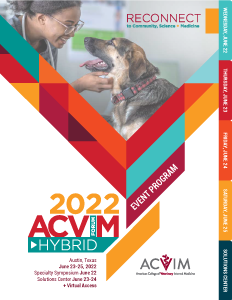Back
Research Abstract - Oral
Small Animal Internal Medicine
OT10 - The PETSORT Statement: Reporting Guidelines for Randomized Controlled Trials Conducted in Dogs and Cats
Thursday, June 23, 2022
11:15 AM – 11:30 AM CT
Location: ACC 18CD
CE: .25

Audrey Ruple, DVM, MS, PhD, DACVPM, MRCVS
Associate Professor
Virginia Tech
Blacksburg, Virginia, United States
Research Abstract - Oral Presenter(s)
Abstract: Background
Comprehensive reporting of randomized clinical trials (RCTs) is essential for the reader to evaluate the methodological rigor of the trial and interpret the generalizability. However, a recent study evaluating comprehensive reporting of published RCTs using dogs and cats found that there were significant deficiencies in reporting trial methods and other information crucial for interpretation of trial results. The Consolidated Standards of Reporting Trials (CONSORT) statement is used to improve reporting of published RCTs conducted in human populations.
Objectives
To create standardized guidelines based on the CONSORT statement to aid researchers in reporting RCTs conducted using dogs and cats.
Animals
None.
Methods
A consensus group of 52 experts in clinical trial design, biostatistics, epidemiology, and subject matter specialists worked together to modify the CONSORT (Consolidated Standards of Reporting Trials) statement to reflect the unique aspects of reporting RCTs conducted in small animals.
Results
The consensus group work resulted in the production of the PETSORT statement for reporting RCTs in dogs and cats and a 25-item checklist that authors can use to ensure complete reporting.
Conclusions and clinical importance
The use of the PETSORT statement, which addresses issues unique to companion animal trials, when designing and publishing RCTs should improve the quality of study design and reporting for trials conducted in dogs and cats.
Comprehensive reporting of randomized clinical trials (RCTs) is essential for the reader to evaluate the methodological rigor of the trial and interpret the generalizability. However, a recent study evaluating comprehensive reporting of published RCTs using dogs and cats found that there were significant deficiencies in reporting trial methods and other information crucial for interpretation of trial results. The Consolidated Standards of Reporting Trials (CONSORT) statement is used to improve reporting of published RCTs conducted in human populations.
Objectives
To create standardized guidelines based on the CONSORT statement to aid researchers in reporting RCTs conducted using dogs and cats.
Animals
None.
Methods
A consensus group of 52 experts in clinical trial design, biostatistics, epidemiology, and subject matter specialists worked together to modify the CONSORT (Consolidated Standards of Reporting Trials) statement to reflect the unique aspects of reporting RCTs conducted in small animals.
Results
The consensus group work resulted in the production of the PETSORT statement for reporting RCTs in dogs and cats and a 25-item checklist that authors can use to ensure complete reporting.
Conclusions and clinical importance
The use of the PETSORT statement, which addresses issues unique to companion animal trials, when designing and publishing RCTs should improve the quality of study design and reporting for trials conducted in dogs and cats.

